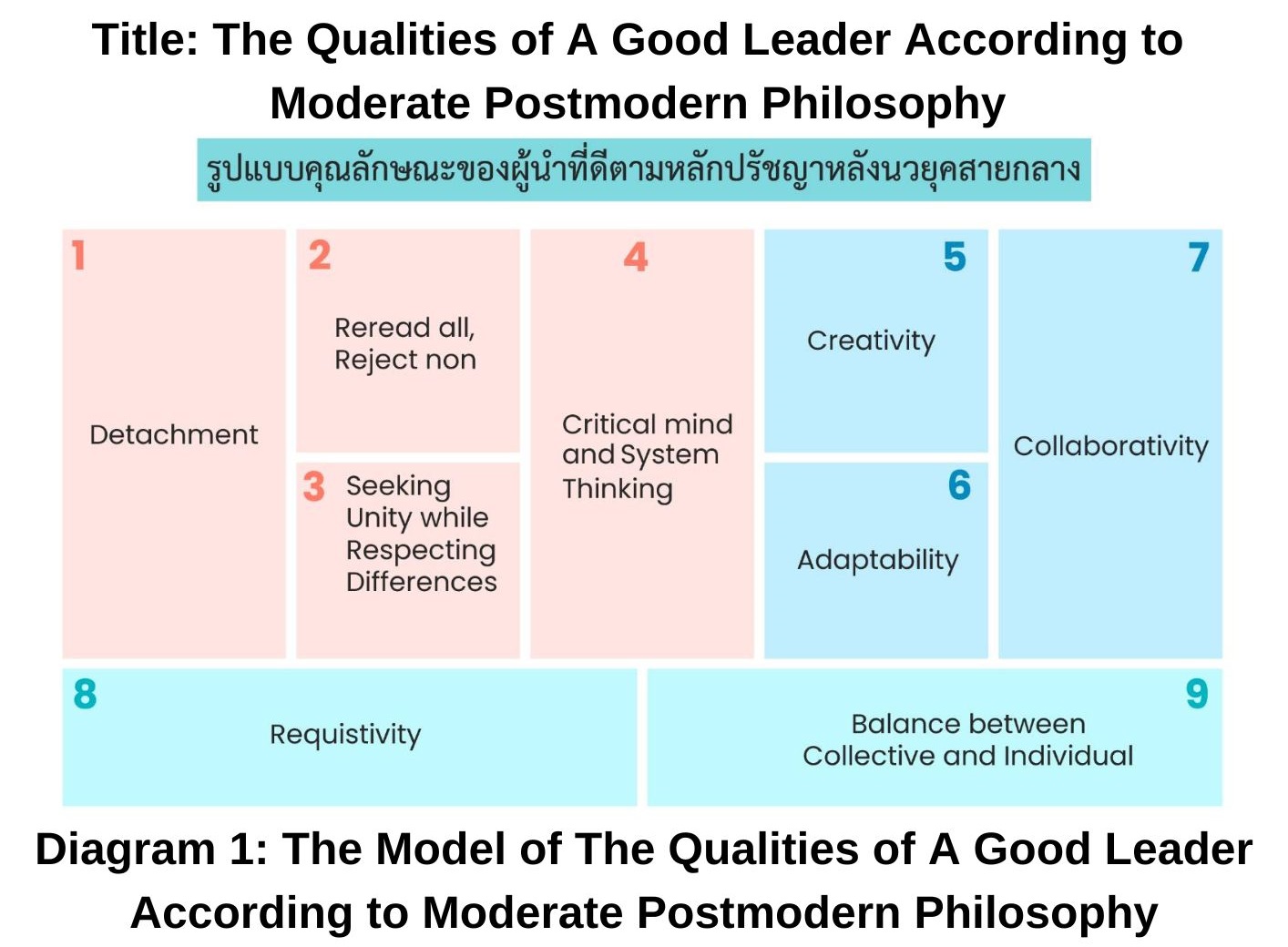The Qualities of A Good Leader According to Moderate Postmodern Philosophy
Keywords:
Good Leader, Qualities, Postmodern, Moderate Postmodern, Moderate Postmodern Philosophy.Abstract
This research article is a qualitative study using document analysis, aimed at analyzing the characteristics of effective leaders according to the principles of postmodern middle-way philosophy. The findings reveal that the characteristics of effective leaders based on these principles should include the following: 1) Detachment: Leaders must have the ability to anchor themselves without becoming overly attached, and they should be open to diverse opinions. 2) Reread all, Reject non : Leaders should be capable of reinterpreting or shifting perspectives on problems and situations without diminishing any related values or realities. 3) Seeking Unity while Respecting Differences : Leaders need to possess the skills to reconcile diverse opinions and guide people to work together efficiently. 4) Critical mind and System Thinking : Leaders should be able to analyze, evaluate, and apply insights intelligently. 5) Creativity : Leaders should have benevolent intentions, a positive attitude, and creative thinking. 6) Adaptability: Leaders must be flexible and able to adapt to changing situations. 7) Collaborativity : Leaders should promote effective teamwork to achieve common goals. 8) Requistivity : Leaders should be open to seeking new knowledge and approaches continuously to improve the quality of life within the organization and society. 9) Balance between Collective and Individual : Leaders need to maintain a balance between organizational needs and individual needs within the team. These characteristics will help leaders manage organizations and societies sustainably.
References
กีรติ บุญเจือ. (2551). คู่มือจริยศาสตร์ตามหลักวิชาการสากล. กรุงเทพฯ : ศูนย์ส่งเสริมและพัฒนาพลังแผ่นดินเชิงคุณธรรม.
ชนธัญ ติ๊บเมืองมา. (2560). ภาวะผู้นำการเปลี่ยนแปลงของผู้บริหารสถานศึกษาในการดำเนินงานประกัน คุณภาพภายในสถานศึกษา สังกัดสำนักงานเขตพื้นที่การศึกษา ประถมศึกษาพะเยา เขต 1. วิทยานิพนธ์ปริญญามหาบัณฑิต. บัณฑิตวิทยาลัย : มหาวิทยาลัยพะเยา.
ชิสา กันยาวิริยะ และ สิรินทร์ กันยาวิริยะ. (2567). ผู้นําคุณธรรมตามหลักปรัชญาหลังนวยุคสายกลาง. วารสารสถาบันพอดี, 1(6), 9-18.
ปรัชญา บุตรสะอาด. (2566). ภาวะผู้นำตามคุณลักษณะของผู้นำที่ดี. วารสารปราชญ์ประชาคม, 1(4), 42-58.
พระธรรมปิฎก (ป.อ. ปยุตโต). (2546). ภาวะผู้นำ. พิมพ์ครั้งที่ 7. กรุงเทพฯ : สุขภาพใจ.
พระราชวชิรเมธี (วีระ วรปญฺโญ). (2559). รูปแบบภาวะผู้นำตามแนวพระพุทธศาสนาของผู้บริหาร มหาวิทยาลัยสงฆ์ไทย. วิทยานิพนธ์ปริญญาดุษฎีบัณฑิต. บัณฑิตวิทยาลัย. มหาวิทยาลัยมหาจุฬาลงกรณราชวิทยาลัย.
พระราชวิจิตรปฏิภาณ (สุนทร ญาณสุนทโร). (2550). ยอดแห่งผู้นำ. กรุงเทพฯ : ธรรมสภา.
เมธา หริมเทพาธิป. (2561). การมีส่วนร่วมในมุมมองหลังนวยุค. รมยสาร, 16(3), 63-77.
วิษณุ อ๋องสกุล. (2558). การพัฒนาภาวะผู้นำผู้ประกอบการในวิทยาลัยอาชีวศึกษาสกลนครพัฒนศิลป์. วิทยานิพนธ์ปริญญาดุษฎีบัณฑิต. บัณฑิตวิทยาลัย : มหาวิทยาลัยราชภัฏสกลนคร.
ศิรประภา อัคราภิชาต และคณะ. (2565). คุณลักษณะภาวะผู้นำของผู้บริหารสถานศึกษาในศตวรรษที่ 21. วารสาร มจร พุทธศาสตร์ปริทรรศน์, 6(3), 276-292.
สุธี สุทธิสมบูรณ์ และ สมาน รังสิโยกฤษณ์. (2564). หลักการบริหารเบื้องต้น. พิมพ์ครั้งที่ 16. กรุงเทพฯ : ประชาชน.
อุทัย โล้วมั่นคง. (2552). การนำเสนอแนวทางการพัฒนาคุณลักษณะภาวะผู้นำทางจริยธรรมตามแนวพุทธศาสนาของผู้บริหารสถานศึกษาสังกัดสำนักงานคณะกรรมการการศึกษาขั้นพื้นฐาน. กรุงเทพฯ : จุฬาลงกรณ์มหาวิทยาลัย.
Chester I. Barnard. (1969). Organization and Management. Cambridge, Massachusetts : Harvard University Press.
Jacobs, T.O. & Jaques, E. (1990). Military executive leadership. In measures of leadership. Eds. By K.E. Clark and M.B. Clark. West Orange, New Jersey : Leadership Library of America.
Ralph M. Stogdill. (1974). Handbook of Leadership : A Survey of Theory and Research. New York : The Free Press.
Ronald W. Stedt. (1974). Management Career Education Programs. Englewood Cliffs, New Jersey : Prentice-Hall.
Stephen R. Covey. (1992). Principle Centered Leadership. New York : Rockefeller Center.
Thomas J. Sergiovanni. (1996). Leadership for the Schoolhouse: How is it different? : Why is it important?. San Francisco : Jossey-Bass.

Downloads
Published
How to Cite
Issue
Section
License
Copyright (c) 2024 Institute of Sufficiency Journal

This work is licensed under a Creative Commons Attribution-NonCommercial-NoDerivatives 4.0 International License.



